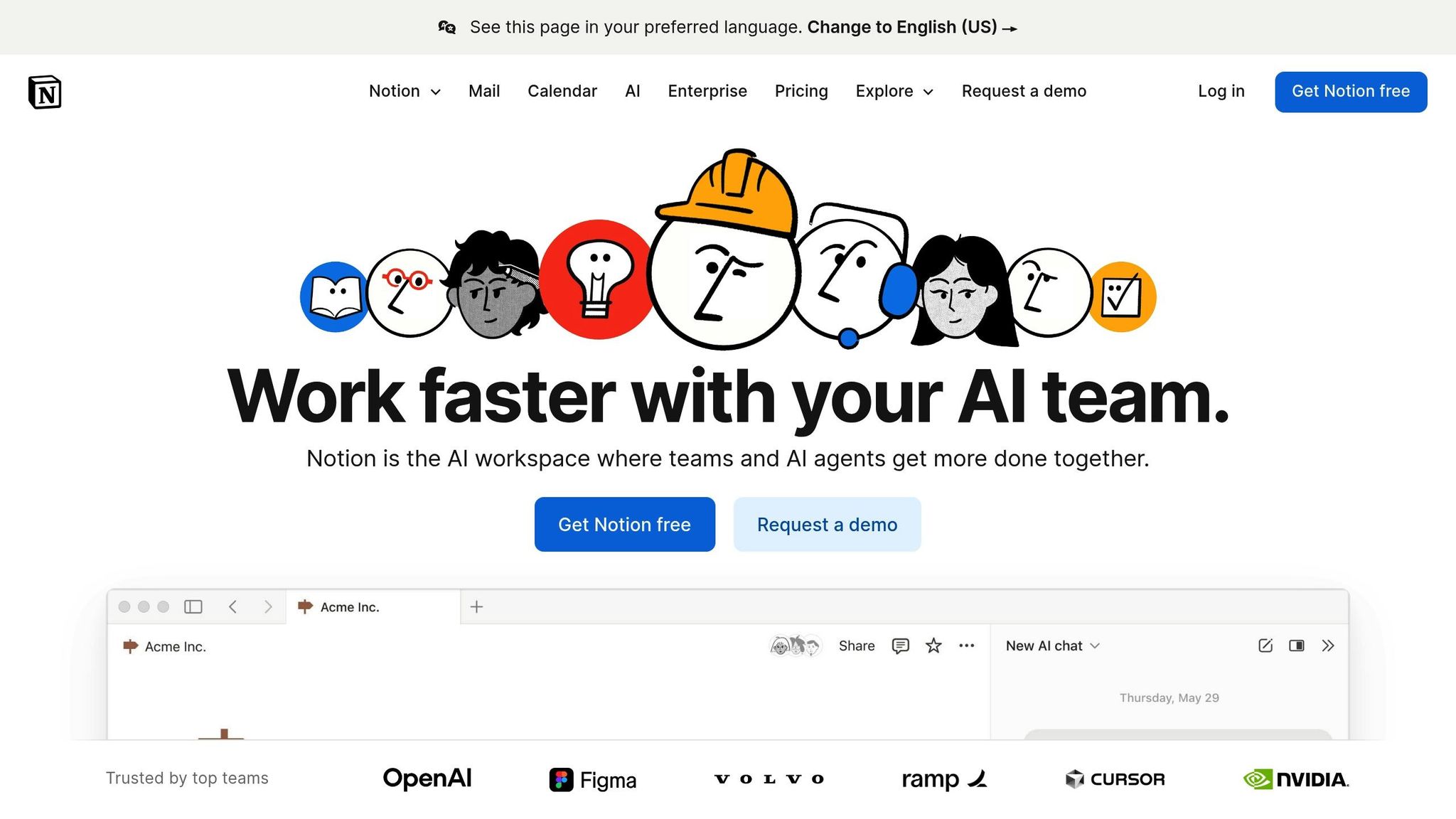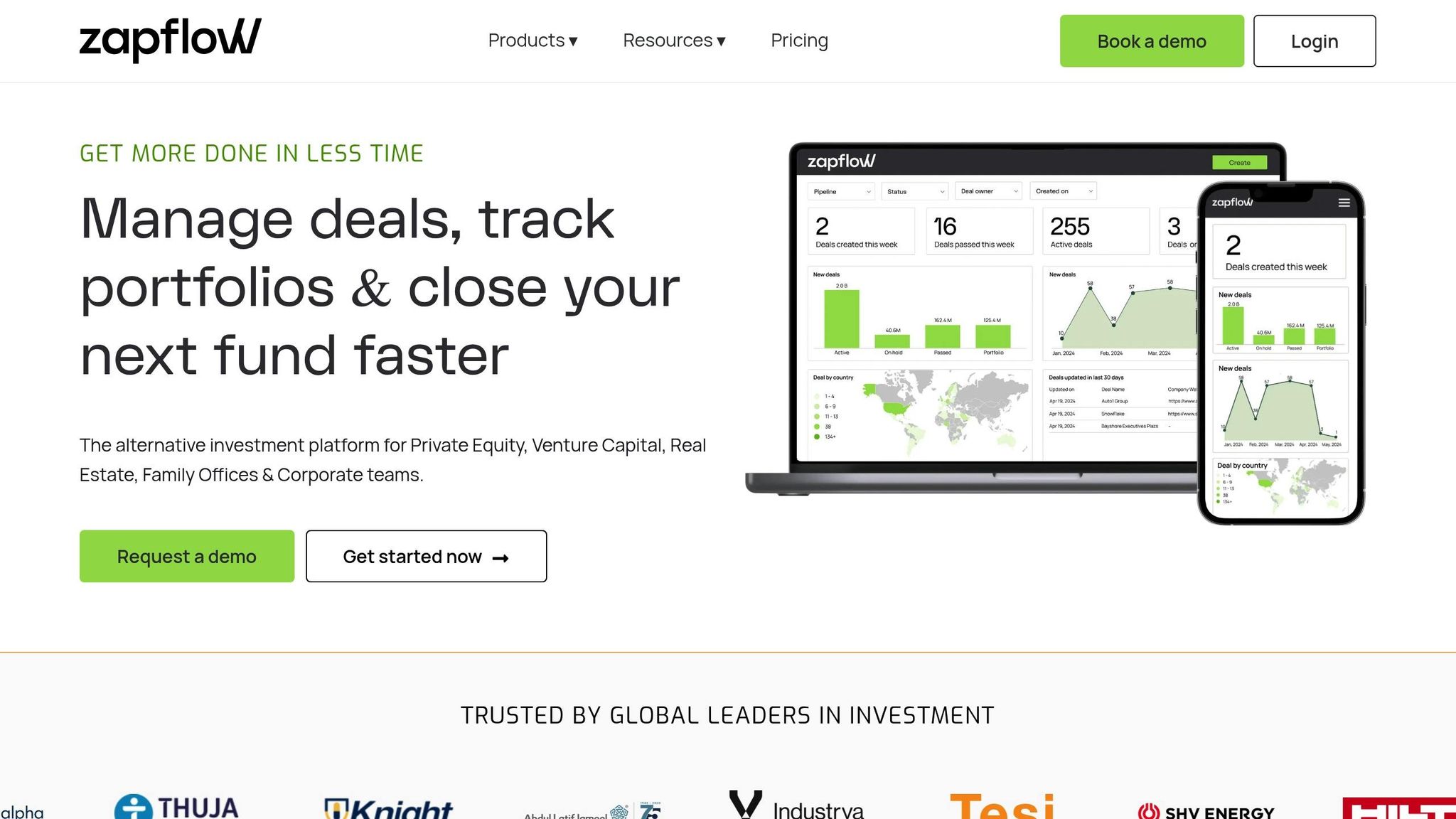Venture capital (VC) firms face increasing pressure to manage deals efficiently while maintaining thorough reviews. The solution? Workflow optimisation. By adopting modern tools and processes, VC teams can reduce repetitive tasks, centralise data, and make faster, well-informed decisions. Here’s what you need to know:
- Deal Flow Management: Streamline every stage, from sourcing opportunities to post-investment tracking, with tools that reduce manual work and ensure consistency.
- VC-Specific CRM Systems: Manage founder relationships, track interactions, and integrate with daily tools like email and calendars.
- Team Collaboration and Reporting: Improve internal communication, secure document sharing, and automate investor reporting.
Automation and templates also play a key role, helping standardise processes, reduce errors, and save time. Tools like Zapflow offer tailored solutions for VC firms, covering deal tracking, compliance, and portfolio performance. With flexible pricing plans starting at £199 per fund per month, teams can address their specific needs without overcomplicating operations.
The takeaway? Efficient workflows allow VC firms to focus on identifying opportunities and supporting portfolio growth, rather than being bogged down by admin tasks. Investing in the right tools and processes is no longer optional - it's a necessity for staying competitive.
How to Manage Simple Venture Capital Dealflow with Notion (2025 Update)

Core Elements of Efficient VC Workflows
Creating an efficient VC workflow relies on three key components that work in harmony to streamline the investment process. These elements transform the often chaotic nature of deal management into a structured system that scales as your firm grows and evolves with market trends.
Deal Flow Management Process
The deal flow lifecycle forms the backbone of every VC operation, covering everything from the first interaction with a startup to monitoring exits. Traditional methods can leave gaps between these stages, leading to delays and frustrations for both investors and entrepreneurs.
Modern deal flow management begins by sourcing opportunities through inbound applications, partner referrals, and proactive outreach. The screening phase then ensures each opportunity is assessed using consistent criteria, helping the team focus on viable options while avoiding time wasted on unsuitable matches.
During due diligence, efficient workflows centralise document storage with version control, ensuring all information is accessible and up-to-date. Investment committee preparation becomes smoother when all materials, analyses, and team feedback are stored in one place.
Post-investment, the workflow continues with structured processes for quarterly reporting, performance tracking, and ongoing communication with founders. Without a well-organised system, portfolio management can become reactive, making it harder to support long-term success.
Automation plays a big role here by cutting down on repetitive tasks. Features like bulk editing allow teams to update multiple deals at once, while automated status updates keep everyone informed without the need for constant manual follow-ups. Over time, these efficiencies add up, freeing teams to focus on strategic work.
While deal flow management is essential, specialised CRM tools can take relationship tracking and management to the next level.
CRM Systems for VC Teams
Standard CRM systems designed for sales often fall short when it comes to the unique needs of VC firms. A VC-specific CRM must handle the complexities of founder relationships, co-investor networks, and long-term portfolio engagement.
By tracking interactions - whether it’s reviewing pitch decks or casual conversations - a VC-specific CRM helps maintain continuity and ensures informed decision-making. For example, an entrepreneur might work on multiple ventures over time, or a successful founder might later become an angel investor. Capturing these connections makes it easier to find warm introductions and identify potential conflicts of interest.
Customisable dashboards cater to the varied needs within a firm. Partners might focus on pipeline metrics and portfolio performance, while analysts require detailed views of tasks and due diligence progress. Configurable views ensure everyone accesses the data they need without being overwhelmed.
Integration is another critical feature. By syncing with email and calendar tools, the CRM becomes part of the team’s routine rather than an extra step. Meeting notes can automatically link to deal records, and email conversations can be logged without manual effort, making the system seamless and intuitive.
Beyond CRM capabilities, fostering strong internal collaboration is vital to ensure workflows run smoothly.
Team Collaboration and Reporting
Collaboration within the team is crucial for driving deals forward. Efficient workflows promote transparency in decision-making while safeguarding sensitive startup data.
Document sharing protocols should strike a balance between accessibility and security, especially when external stakeholders like limited partners or co-investors need access to specific files. Version control eliminates confusion when multiple team members contribute to investment memos or due diligence reports, and audit trails ensure accountability for key decisions.
Automated investor reporting takes the administrative load off investment teams, ensuring consistency across reporting periods. This is particularly helpful for tracking ESG compliance, which can be integrated into workflows to simplify regulatory reporting. Systems that collect ESG metrics throughout the investment process make it easier to stay compliant without scrambling for data at the last minute.
Audit trails also support both internal governance and external requirements. By automatically logging every decision, document access, and communication, firms can demonstrate proper processes during fundraising or regulatory reviews. These records are also invaluable for analysing the outcomes of both successful and unsuccessful investments.
Finally, collaboration tools keep teams aligned, even when working across different locations or schedules. Automated updates on deal progress and seamless task assignments ensure momentum is maintained without the need for constant meetings. This keeps the investment process moving efficiently, no matter where team members are based.
Methods for Workflow Optimisation
Refining workflow processes can make a significant difference in how efficiently VC firms evaluate potential investments. One effective way to achieve this is by incorporating automated template systems.
Automation and Template Systems
Template systems are a smart way to bring consistency and speed to investment evaluations. By standardising the process, they help VC teams focus on what matters most.
For instance, investment memo templates can include sections for essential information like key business details, financial projections, competitive analysis, and reference checks. Organising data in this structured way allows teams to quickly compare opportunities side by side. When paired with automation tools - like auto-filled fields and CRM integration - manual work is reduced, and the risk of errors drops significantly.
These automation techniques, when combined with improved deal management and CRM tools, create a more efficient and seamless workflow for VC teams.
sbb-itb-d63e044
How Zapflow Supports VC Workflow Optimisation

Zapflow is specifically designed to handle the intricate demands of venture capital (VC) operations, from managing deal flows and investor relationships to monitoring portfolio performance. Its features and pricing are tailored to address the unique challenges VC professionals face.
Features and Benefits
Zapflow’s CRM system is built to meet the distinct requirements of venture capital and private equity (PE) operations. It simplifies the complexities of deal flow tracking, investor relations, and portfolio management.
Deal Flow Management
At the heart of Zapflow is its deal flow management capability. It consolidates all investment data and tracks each stage of the process, offering teams a comprehensive view of their pipeline. This not only streamlines decision-making but also reduces the administrative workload that can slow down progress.
Collaboration Tools
Zapflow’s collaboration features enhance team communication. They allow stakeholders to share deal insights, coordinate due diligence, and maintain consistent communication - all within a single platform. This eliminates the need to juggle multiple tools.
Portfolio Management
The platform’s portfolio management tools enable firms to oversee investments after closing. It supports quarterly reporting, tracks performance metrics, and accommodates ESG reporting - a growing priority for institutional investors and regulatory compliance.
Compliance Features
For operations requiring strict adherence to regulations, Zapflow includes KYC/AML screening and sanction list monitoring. These tools help firms meet compliance standards without adding unnecessary complexity to their workflows.
Custom Dashboards and Reporting
Zapflow also provides customisable dashboards and reporting tools, offering real-time insights into fund performance, deal pipeline progress, and investor engagement. Teams can tailor these dashboards to meet their specific reporting needs.
With its targeted features and flexible pricing, Zapflow ensures VC professionals have the tools they need without overcomplicating their operations.
Pricing Plans
Zapflow’s pricing is structured around operational needs rather than user numbers, aligning with how VC firms typically allocate their budgets.
- Front Office Plan: Priced at £995 per team per month, this plan covers deal flow, fundraising tools, and exit management.
- Investor Relations Plan: At £199 per fund per month, this package includes CRM features, LP portal access, and investor report generation.
- Portfolio Management Plan: Also £199 per fund per month, this plan supports quarterly reporting, ESG compliance, and holdings tracking.
- Compliance Plan: Available for £995 per month, it includes KYC/AML screening, sanction list monitoring, and risk management tools.
Zapflow also offers optional add-ons like advanced deployment, legal entity mapping, e-signatures, and custom dashboards, with pricing varying based on the specific requirements.
This modular pricing approach allows firms to tailor their subscriptions to match their immediate priorities, whether that’s deal origination, investor relations, or compliance. Teams can start with the essentials and expand as their needs grow.
Conclusion
Improving workflows in venture capital doesn’t just streamline operations - it empowers investment teams to work smarter and make better decisions. Successful firms understand that workflow efficiency is more than just a back-office concern; it’s a strategic advantage in a competitive landscape.
Key components like efficient deal flow management, reliable CRM systems, and stronger team collaboration combine to significantly boost productivity. This becomes even more essential as deal volumes grow and investors expect faster, more informed decisions.
Technology plays a pivotal role here, automating repetitive tasks and ensuring no critical insights get buried in endless spreadsheets or email chains. This efficiency translates into quicker decision-making and more consistent processes. A great example of this is Zapflow, which provides solutions tailored specifically to the needs of VC firms.
Zapflow’s modular approach shows how customised SaaS tools can tackle the unique challenges faced by venture capital teams without adding unnecessary complexity. Its flexible pricing model also aligns with the varying needs and growth stages of VC firms, making it a practical choice for teams of any size.
As the investment world becomes increasingly demanding, continuous improvements in workflow efficiency will be essential. Firms that embrace these advancements will be better equipped to handle larger deal volumes, exceed investor expectations, and achieve stronger returns in the future.
The real question isn’t whether VC firms should optimise their workflows - it’s how quickly they can make these changes a reality.
FAQs
How do VC-specific CRM systems improve founder relationship management and investment tracking?
VC-focused CRM systems simplify managing founder relationships and tracking investments by bringing all relevant data into one place and automating essential tasks. These tools help streamline communication, keep the deal pipeline organised, and improve teamwork between investors, founders, and other stakeholders.
By automatically recording interactions and syncing with other software, they cut down on manual work, minimise mistakes, and provide a centralised workspace. This means less time spent on admin and more time for VCs to strengthen relationships and make informed investment decisions.
What advantages do VC firms gain by automating their deal flow management?
Automating deal flow management brings a host of advantages to venture capital (VC) firms. It simplifies the way potential investments are sourced and evaluated, cutting down on manual tasks and boosting overall efficiency. One of the standout perks? Real-time visibility into both the deal pipeline and portfolio performance, which helps firms make quicker, smarter decisions.
By doing away with repetitive data entry and fostering better collaboration among teams, automation not only saves valuable time but also trims operational costs. This means VC professionals can dedicate more energy to spotting promising opportunities and allocating resources effectively. The result? Greater productivity and a better chance of landing successful investments.
How does Zapflow's pricing adapt to the unique needs of different VC firms?
Zapflow provides a flexible pricing model tailored to the varied needs of venture capital firms. The structure is based on pipeline types and operational teams, with the added advantage of allowing unlimited users for greater adaptability.
Pricing begins at €199 per user per month for the Front Office Edition, with options extending up to €1,995. For larger organisations or firms with specialised requirements, custom quotes are available to deliver personalised solutions.


